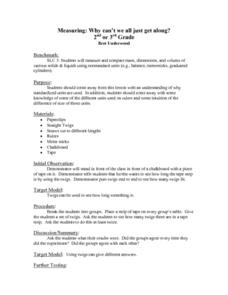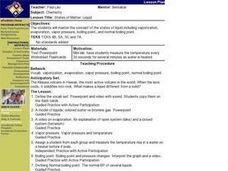Curated OER
Measuring: Why Can't We All Just Get Along?
Students examine why having standardized units of measurement is important. They investigate the use of non-standard measure, twigs, while measuring the piece of tape. Next, they experiment with straws, paper clips, and rulers before...
Curated OER
A Matter of Fact
Third graders define matter as anything that takes up space and has mass, recognize, through experimentation and observation, that matter exists in three forms, including solid, liquid, and gas, and discuss characteristics of each form...
Baylor College
We Need Water
There's nothing quite like a glass of ice-cold, freshly squeezed lemonade. Lesson seven of this series explains how the water humans need to survive can come in many forms. Teach your class about how much water humans require every day...
Michigan State University
Gases Matter
Young scientists learn that seeing isn't necessarily believing when it comes to the states of matter. After performing a fun class demonstration that models the difference between solids, liquids, and gases, children complete a series of...
NASA
States of Matter
Water, one of the basic needs of humans, is found in all three states of matter on Earth; no other planet—that we know of—possesses this quality. Here is a unit that allows learners to explore through experimentation what it takes to...
University of Colorado
Happy Landings: A Splash or a Splat?
Huygens spacecraft landed on Saturn's moon Titan in 2005, making it the farthest landing from Earth ever made by a spacecraft. In this hands-on activity, the 12th installment of 22, groups explore how density affects speed. To do this,...
Teach Engineering
Floaters and Sinkers
Whatever floats your boat. Young engineers learn about density by measuring the masses and volumes of boxes filled with different materials. Using their knowledge of densities, they hypothesize whether objects with given densities will...
Curated OER
Earth's Water
If the majority of our planet is covered with water, why do we need to bother conserving it? With a thorough and varied investigation into the location and types of water on the earth, learners will gain an understanding of why this...
Curated OER
States of Matter: Liquid
Students work in a mini lab where they measure the temperature every 30 seconds for several minutes as water is heated. They are asked what makes liquid different from a solid. Students view a PowerPoint on the model of liquids,...
Columbus City Schools
What’s Up with Matter?
Take a "conservative" approach to planning your next unit on mass and matter! What better way to answer "But where did the gas go?" than with a lab designed to promote good report writing, research skills, and detailed observation. The...
media.yurisnight.net
Science Lesson Plan: Our Solar System: I Wonder?
Ever wonder why Pluto isn't considered a planet? Or how large the Earth is compared to the other inner planets? Explore the universe with a series of projects that simulate different aspects of our solar system. The activities require...
Curated OER
Matter
Students complete a unit of activities to learn about states of matter and how to measure matter. In this matter lesson, students complete 8 lessons to learn about matter, its states, and how to measure matter.
Curated OER
2nd Grade Physical Sciences
Second graders complete activities to measure motion and learn about the Earth's history. In this motion and Earth history lesson, 2nd graders discuss sound and complete a matching sound activity. Students then study the history of Earth...
Curated OER
The Solution to Pollution is Dilution
Students consider what happens to herbicides or insecticides that are used in agricultural practices, especially herbicides that are used to control noxious weeds. They become acquaint with a chemical assessment method known as...
Pace University
Volume and Capacity
Differentiated instruction through leveled learning contracts boosts scholars' knowledge of volume and capacity. Participants split into three groups based on ability and interest before choosing three activities from their learning...
Curated OER
What's the Matter? Where Did it Go?
Eighth graders analyze questions posted on a large poster in the room and work in groups to record their response to the question on paper, rotating to the next question after two minutes have passed. They review the characteristics of...
Cornell University
Buoyancy
Swimmers know to float by turning their bodies horizontally rather than vertically, but why does that make a difference? In an interesting lesson, scholars explore buoyancy and the properties of air and water. They test cups to see which...
Federal Reserve Bank
The Great Inflation: A Historical Overview and Lessons Learned
Your young economists will explore the roots of fears about high inflation by learning the effects of rising prices during the world wars and in particular the Great Inflation of the 1970s.
NASA
Christa's Lost Lesson: Effervescence
How are chemical reactions affected by gravity? Learners explore the phenomenon of effervescence as part of the Christa's Lost Lessons series. They compare findings in an experiment on effervescence to a video of a similar experiment in...
Curated OER
Creeping Sheets of Ice
Students conduct scientific investigation in which they observe glacial
effects on landscape, develop and explain their own theories of how glaciers change land, and demonstrate understanding and explain basic motion and force principles.
Curated OER
The Grouchy Ladybug
Pupils complete a Cirlce Map about time. They recall times during the grouchy ladybugs travels, and add dots on ladybugs using turn-around facts. Pupils correctly sequence the events of The Grouchy Ladybug. Students compose new...
Curated OER
Water Quality Monitoring
Students comprehend the four parameters of water quality. They perform tests for salinity, dissolved oxygen, pH and clarity or turbidity. Students comprehend why scientists and environmental managers monitor water uality and aquatic...
Curated OER
What is a Watershed, Anyway?
Students constrct a watershed and write about their observations. Students use maps to locate their area in relation to the watershed and inquire about what is applied to the ground above.
























